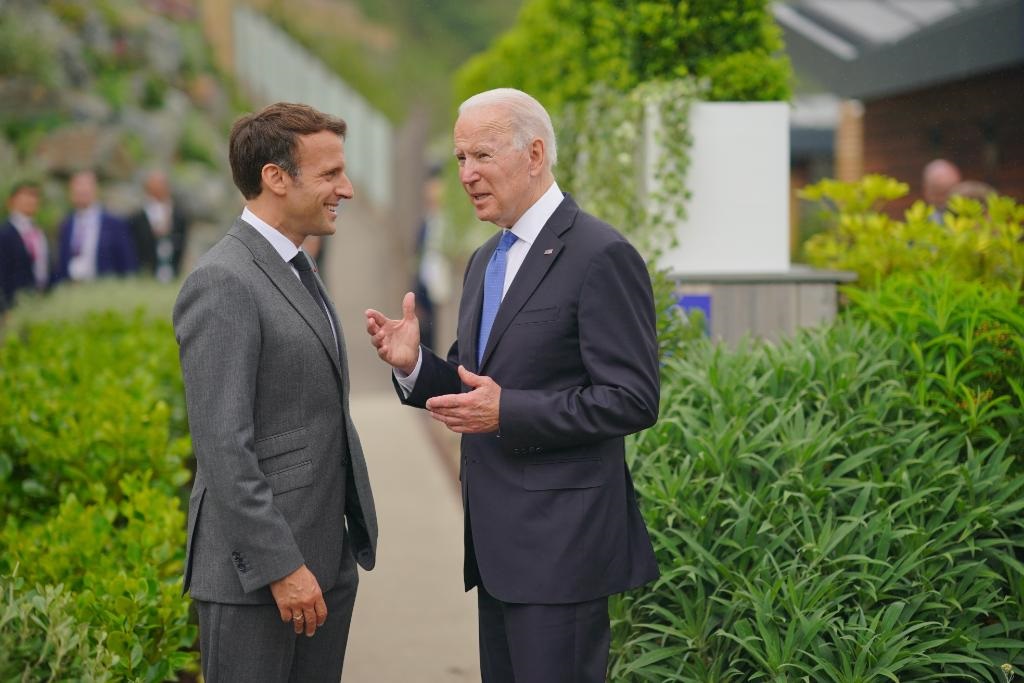The recent alliance between the US, UK and Australia, referred to as AUKUS, appears to be creating geo-political ripples in the international community of late. AUKUS, which is a trilateral security pact between the three English-speaking nations, aims to counter Chinese aggression in the Indo-Pacific region and as the first move towards achieving that objective, Australia will be armed with nuclear-powered submarines. Australia will make these submarines with the advanced technology that is shared by the US and the UK.
So, where does the ‘betrayal’ vis-a-vis the French come in picture?
Post the formal announcement of the AUKUS military alliance, Australia backed off from a multi-billion dollars submarine deal that it inked with France in 2016 as per which Australia was supposed to procure a certain number of French submarines. A fuming France called this Australian decision as ‘a stab in the back’ and retaliated diplomatically by calling back its ambassadors to the US and Australia for ‘consulting’ with them further on this issue. However, French President Emmanuel Macron after discussing the AUKUS dispute in a phone call with his American counterpart President Joe Biden, has decided to send the French ambassador to the United States back to Washington DC.
But did Australia really betray France?
In binary terms: Yes!
The Australian administration, however, is justifying its abrupt exit from the submarine deal with France by pointing out the strong & constantly growing regional threats that it is facing from the expansionary attitude of China. The submarines that France was supposed to provide Australia were diesel-electric submarines and from an Australian point of view, the security concerns that Australia is currently facing as well as is likely to face in the times-to-come are better addressed by nuclear-powered submarines which are much quieter than the diesel-powered ones and therefore can safely & more efficiently operate deep into ‘risky waters’.
The Primary Objective: Countering China
Since the AUKUS alliance is focused at countering Chinese aggression in the Indo-Pacific region and more precisely in the South China Sea, the Communist Party of China didn’t take too long to criticise AUKUS and express their well anticipated displeasure towards it.
Not long ago, when China ruthlessly crushed the Hong Kong Pro-Democracy movement, many nations of the world started to reconsider their ideological as well as strategic positions vis-a-vis an expansionary China. When Australia started expressing its concerns over China’s suppressive actions and more recently supported the call for a global inquiry into China’s handling of the Coronavirus Pandemic that allegedly emerged from China, the relationship between Canberra and Beijing witnessed a gradual downfall. Earlier this year, China not only ‘indefinitely suspended’ economic dialogue with Australia but also targeted Australian agriculture industries by imposing huge tariffs upon them.
However, a possible flash point in the future between China and multiple nations especially those representing AUKUS, could be ‘Taiwan’. China’s obsession with annexing Taiwan by force is no secret to the world. The way China has accomplished a strong strategic naval build up in the South China Sea and has been locking horns with the US and other nations over the issue of free navigation through the region, it is only a matter of time when China could launch a military offensive revolving around Taiwan.
China wants to annex Taiwan because Taiwan indirectly challenges the fundamental notion of the Chinese Communist Party which asks the citizens to give up on their liberty and the party would in-turn offer them ‘prosperity’. But, Taiwan is a shining example of how a vibrant democracy can offer astounding prosperity to its people. Hence, the one party rule in China which is accountable & answerable to no one has always been uncomfortable with the Taiwanese model of governance.
Apart from this, Taiwan’s huge foreign exchange reserves immediately attract the expansionary mindset of China. Going by the latest August 2021 statistics, the Taiwanese foreign exchange reserves stand at USD 543.58 billion. This is an enormous figure that speaks volumes about Taiwan’s economic might considering the geographical size and population of Taiwan.
Last, but not least, if China manages to engulf Taiwan then it would be a big blow to the United States’ global superpower status and with India already in a face-off with China along its borders, this would make countries like Japan and South Korea worry for their respective territorial sovereignty in the immediate future.
However, AUKUS is an extremely well thought out military alliance that has undoubtedly forced the Chinese to factor in the component of ‘consequences’ into their expansionary agenda and the US with its superpower status at stake has signaled a ‘loud warning shot to China’.
(Akhil Pathak is an independent writer and an observer of global politics/geo-strategic matters with special focus on issues that are directly or indirectly related to the security framework of India)
[Disclaimer: The opinions, beliefs, and views expressed by various authors and forum participants on this website are personal.]

